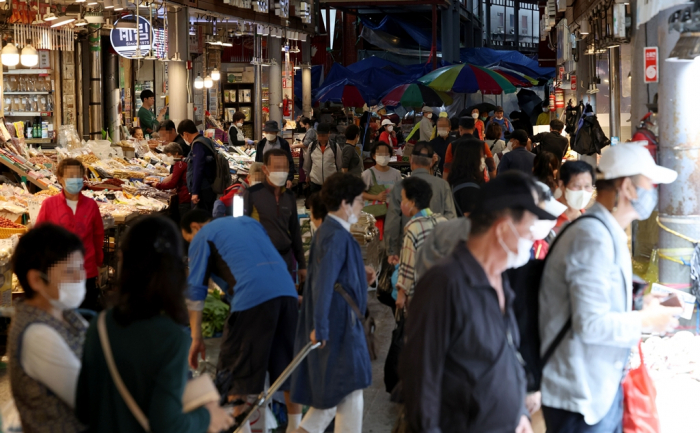BOK mulls 50-bp rate hike despite slower Sept inflation
Korea’s headline inflation eases to 5.6% in Sept. from 5.7% in Aug, but core inflation accelerates to 4.1%, the highest since Dec. 2008
By Oct 05, 2022 (Gmt+09:00)
LG Chem to sell water filter business to Glenwood PE for $692 million


Kyobo Life poised to buy Japan’s SBI Group-owned savings bank


KT&G eyes overseas M&A after rejecting activist fund's offer


StockX in merger talks with Naver’s online reseller Kream


Mirae Asset to be named Korea Post’s core real estate fund operator



South Korea’s headline inflation slowed in September for a second straight month on lower oil prices, but the central bank is still predicted to take a tightening step such as a 50-basis-point interest rate hike next week, given a widening discount against US borrowing costs and a weaker won currency.
Consumer prices grew 5.6% last month from a year earlier, lower than 5.7% in August and a 24-year high of 6.3% in July, government data showed on Wednesday. The data caused hopes that inflationary pressure in Asia’s fourth-largest economy may ease.
The government stuck to its earlier expectations that inflation is likely to peak in October.
“We have not changed (the view),” Finance Minister Choo Kyung-ho told lawmakers. “Inflation often sharply falls when it peaks, but this time it will ease gradually from high levels for a certain period of time.”
But annual core inflation, which excludes volatile food and energy prices, accelerated to 4.1%, the highest since December 2008, suggesting the country has remained vulnerable to inflationary pressure.
The Bank of Korea remained wary of inflationary pressure as overall inflation could top 6% again on a softer won and hikes in utility bills.
“Headline inflation eased, but core inflation continued to accelerate led by personal service items,” said BOK Deputy Governor Lee Hwan-seok after the data. “Consumer prices are forecast to keep rising 5-6% for a considerable period of time.”
“The uncertainties remained high, given the development of the Russia-Ukraine war and global tightening bias. A weaker won and wider output cuts of major oil-producing countries maintained upside risks.”
WON, UTILITY BILLS
The won was the worst performer among emerging Asian currencies in the first nine months of this year with a 17% loss against the dollar during the period. The South Korean unit on Sept. 28 hit 1,442.4 versus the greenback on Sept. 28, the weakest level since March 16, 2009.
Such weakness often ramps up import prices, adding to overall inflationary pressure. The BOK predicted a 1% rise in the dollar/won exchange rate to push up inflation by 0.03 percentage point.
“The sustained weakness in the won is likely to put additional upward pressure on inflation,” has said BOK Governor Rhee Chang-yong.
The South Korean currency is expected to remain soft next year as the US Federal Reserve’s strong determination to stem inflation will keep supporting the dollar, analysts forecast. The local unit may depreciate further, weakening past the 1,500 per dollar level for the first time since the 2008-09 global financial crisis, if the war in Ukraine persists or the global economy slips into recession, they added.
Domestic utility bills also increased. Korea Electric Power Corp. is raising power rates by 7.4 won (0.5 cent) per kilowatt-hour (kWh) from this month, while the Ministry of Trade, Industry and Energy announced city gas bills for private sectors by 2.7 won per megajoule (MJ) from November. Such hikes are predicted to raise consumer inflation by 0.3 percentage point.
RATE HIKE EXPECTED
The BOK is expected to raise its benchmark interest rate, which is currently 2.50%, in its meeting on Oct. 12, analysts said. The base interest rate is already lower than the Fed’s federal funds rate of a range of 3.00-3.25%.

But such a step could dampen South Korea’s economic growth, which is already slowing down due to sluggish exports, analysts said. Higher borrowing costs could also weaken private consumption with household debt at a record high 1,757.9 trillion won as of end-June.
The government and the central bank last week spent a total of 5 trillion won to bring down bond yields.
“The BOK cannot stay still as the rate gaps between South Korea and the US were widening and the won kept weakening,” said Jung Yong-taek, head of research at IBK Investment & Securities Co., adding investors should leave the door open for another big step by the BOK. The central bank in July delivered its first 50-bp rate hike in its history.
The monetary authorities are unlikely to maintain such a hawkish stance, Jung added.
“The UK and Europe raised much less (than the Fed) even as their inflation is much higher than the US,” Jung added.
Write to Byung-Uk Do and Sun Hee Chae at dodo@hankyung.com
Jongwoo Cheon edited this article.
-

-
 Foreign exchangeFalling won yet to cool Koreans’ fever for overseas travel
Foreign exchangeFalling won yet to cool Koreans’ fever for overseas travelSep 28, 2022 (Gmt+09:00)
2 Min read -
 Central bankBOK chief signals another big step as Fed hike haunts won
Central bankBOK chief signals another big step as Fed hike haunts wonSep 22, 2022 (Gmt+09:00)
5 Min read -
 EconomyKorea inflation slows, but BOK may still hike interest rates
EconomyKorea inflation slows, but BOK may still hike interest ratesSep 02, 2022 (Gmt+09:00)
2 Min read -
 Central bankBOK delivers fourth straight rate hike as inflation persists
Central bankBOK delivers fourth straight rate hike as inflation persistsAug 25, 2022 (Gmt+09:00)
3 Min read -
 EconomyKorea inflation hits highest point since 1998 crisis, BOK to hike rates
EconomyKorea inflation hits highest point since 1998 crisis, BOK to hike ratesAug 02, 2022 (Gmt+09:00)
3 Min read -
 Central bankBOK likely to take 50-bp big step hike to curb inflation
Central bankBOK likely to take 50-bp big step hike to curb inflationJul 12, 2022 (Gmt+09:00)
1 Min read


